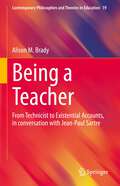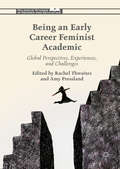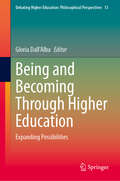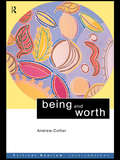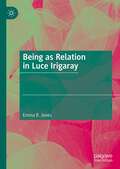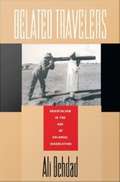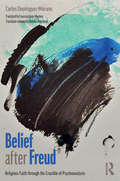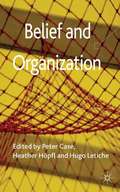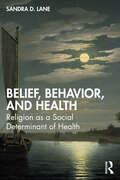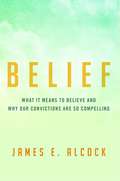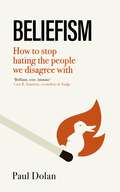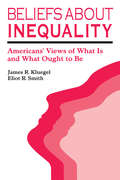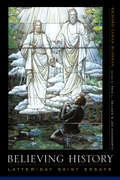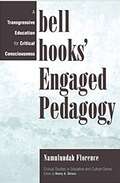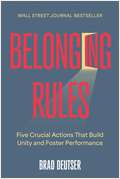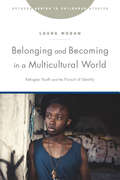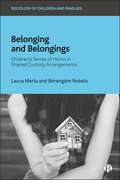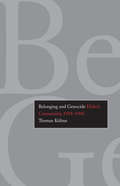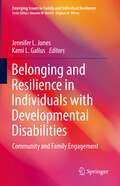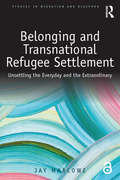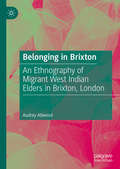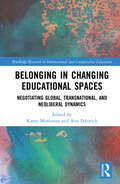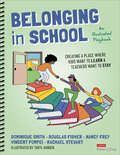- Table View
- List View
Being a Teacher: From Technicist to Existential Accounts, in conversation with Jean-Paul Sartre (Contemporary Philosophies and Theories in Education #19)
by Alison M. BradyThis book re-conceptualizes teaching through an engagement with Jean-Paul Sartre’s early existentialist thought. Against the grain of teacher accountability, it turns to the demanding account of being human in Sartre’s thought, on the basis of which an alternative account of teaching can be developed. It builds upon Sartre’s key concepts related to the self, freedom, bad faith, and the Other, such that they might open up original ways of thinking about the practices of teaching. Indeed, given the everyday complexities that characterize teaching, as well as the vulnerabilities and uncertainty that it so often involves, this book ultimately aims to create a space in which to reimagine forms of accounting that move from technicist ways of thinking to existential sensitivity in relation to one’s practice as a teacher.
Being an Early Career Feminist Academic: Global Perspectives, Experiences and Challenges (Palgrave Studies in Gender and Education)
by Rachel Thwaites and Amy PresslandThis book highlights the experiences of feminist early career researchers and teachers from an international perspective in an increasingly neoliberal academy. It offers a new angle on a significant and increasingly important discussion on the ethos of higher education and the sector's place in society. Higher education is fast-changing, increasingly market-driven, and precarious. In this context entering the academy as an early career academic presents both challenges and opportunities. Early career academics frequently face the prospect of working on fixed term contracts, with little security and no certain prospect of advancement, while constantly looking for the next role. Being a feminist academic adds a further layer of complexity: the ethos of the marketising university where students are increasingly viewed as ‘customers’ may sit uneasily with a politics of equality for all. Feminist values and practice can provide a means of working through the challenges, but may also bring complications.
Being and Becoming Through Higher Education: Expanding Possibilities (Debating Higher Education: Philosophical Perspectives #13)
by Gloria Dall’AlbaThis book focuses on the importance of an ontological dimension for today’s higher education, with critical attention to implications for the student experience, engagement, satisfaction, wellbeing, employability, (dis)embodiment and activism in which students take a stand on their own being and becoming. In accessible language, key philosophical ideas are explored for their relevance to contemporary higher education, integrating philosophical with pedagogical perspectives. Although much of the material has been published previously, there is value in bringing it together into a single volume in exploring an ontological dimension of higher education as it is embodied. In doing so, the book demonstrates benefits to pedagogy through sustained attention to philosophy and theory, and vice versa, thereby contributing to recent heightened interest in the philosophy and theory of higher education. This book is intended to prompt re-imagining the ways in which higher education is conceived and conducted. An argument is put forward for greater emphasis on expanding possibilities for knowing, acting and being, toward fuller lives of interdependence with others and things in an interconnected world. Through highlighting an ontological dimension in this manner, a hope-filled future emerges for higher education.
Being and Worth (Critical Realism: Interventions (Routledge Critical Realism))
by Andrew CollierBeing and Worth extends recent depth-realist philosophy to the question of values. It argues that beings both in the natural and human worlds have worth in themselves, whether we recognise it or not. This view is defended through and account of the human mind as essentially concerned with that of which it is independent. Conclusions follow both for environmental ethics - that natural beings should be valued for themselves, not just for their use to us - and for justice in the human world, based on the idea that humans are unique and equal in respect of 'having a life to live'.
Being as Relation in Luce Irigaray
by Emma R. JonesMany scholars have struggled with Irigaray’s focus on sexuate difference, in particular with her claim that it is “ontological,” wondering if this implies a problematically naïve or essentialist account of sexuate difference. As a result, the ethical vision which Irigaray elaborates has not been taken up in a robust way in the fields of philosophy, feminism, or psychoanalysis.By tracing the notion of relation throughout Irigaray’s work, this book identifies a rigorous philosophical continuity between the three self-identified “phases” in Irigaray’s thought (despite some critics’ concerns that there is a discontinuity between these phases) and clarifies the relational ontology that underlies Irigaray’s conceptualization of sexuate difference – one that always already implies an ethical project.The text demonstrates that an understanding of Irigaray’s Heideggerian inheritance – especially prominent in her later texts – is essential to grasping the sense of the idea that sexuate difference is ontological – it concerns Being, rather than beings. This book further develops potential applications of this ontological notion of a “relational limit” for the fields of philosophy, feminism, and psychotherapy.
Belated Travelers: Orientalism in the Age of Colonial Dissolution
by Ali BehdadIn Belated Travelers, Ali Behdad offers a compelling cultural critique of nineteenth-century travel writing and its dynamic function in European colonialism. Arriving too late to the Orient, at a time when tourism and colonialism had already turned the exotic into the familiar, late nineteenth-century European travelers to the Middle East experienced a sense of belatedness, of having missed the authentic experience once offered by a world that was already disappearing. Behdad argues that this nostalgic desire for the other contains an implicit critique of Western superiority, a split within European discourses of otherness. Working from these insights and using analyses of power derived from Foucault, Behdad engages in a new critique of orientalism. No longer viewed as a coherent and unified phenomenon or a single developmental tradition, it is seen as a complex and shifting field of practices that has relied upon its own ambivalence and moments of discontinuity to ensure and maintain its power as a discourse of dominance. Through readings of Flaubert, Nerval, Kipling, Blunt, and Eberhardt, and following the transition in travel literature from travelog to tourist guide, Belated Travelers addresses the specific historical conditions of late nineteenth-century orientalism implicated in the discourses of desire and power. Behdad also views a broad range of issues in addition to nostalgia and tourism, including transvestism and melancholia, to specifically demonstrate the ways in which the heterogeneity of orientalism and the plurality of its practice is an enabling force in the production and transformation of colonial power. An exceptional work that provides an important critique of issues at the forefront of critical practice today, Belated Travelers will be eagerly awaited by specialists in nineteenth-century British and French literatures, and all concerned with colonial and post-colonial discourse.
Belief after Freud: Religious Faith through the Crucible of Psychoanalysis
by Carlos Domínguez-MoranoBelief after Freud confronts the psychoanalytic experience and the experience of faith. A purified vision of faith, so many times disfigured by infantile or neurotic dynamics, can emerge through the crucible of psychoanalysis. The work contributes to the dialogue between psychoanalysis and faith, based on the respective lived experiences, rather than from theoretical positions only. The book is divided into three parts:Part I centres on Freud’s position on religion. After an introductory chapter assessing Freud’s present validity, the following chapters critically examine Freud’s position and interpretation of religion.Part II examines how people of faith experience psychoanalysis, including the role played by unconscious feelings of guilt, and the ideas of sin and salvation.Part III explores ideas of sexuality, power, and obedience, including the unconscious and pathological roots of the relation with money, and the sense of evangelical poverty.Now in its fifth edition in Spain, Belief after Freud has also been published in Argentina and Brazil. Many readers say the book has opened a new form of belief for them. The book has also been of great interest to non-believing psychologists.
Belief and Organization
by Peter Case Hugo Letiche Heather HöpflExamines the alternative belief systems which contemporary organizational actors live by and through which they seek to find meaning within the dominant (neo)capitalist social order. This volume marks an attempt to move the study of belief forward within management and organization studies.
Belief, Behavior, and Health: Religion as a Social Determinant of Health
by Sandra D. LaneThis book uniquely examines, across cultures, the health benefits and detriments of religious beliefs, with important implications for individual wellbeing and human survival.Belief, Behavior, and Health takes the reader through journeys of the author’s research in the Middle East, Africa, and the urban United States, where she focused on the unequal health and survival of women globally and vulnerable groups in the United States. Almost every health problem, especially those experienced by the poor and disadvantaged, arose from or was made worse by the conditions in the environment in which people lived. Lane’s detailed studies of beliefs about Judaism, Christianity, and Islam led to the author’s deep observations on how religious belief and practice, as well as discrimination due to religious prejudice, can be a major influence on health, both positively and negatively. In this book, Lane shows how religious precepts and cultural influences on religious behavior function as social determinants of health. An accessible and compelling read, this book will appeal to students and scholars of public health, anthropology, and sociology and those interested in the influence of religion on health outcomes.
Belief: What It Means to Believe and Why Our Convictions Are So Compelling
by James E. AlcockAn expert on the psychology of belief examines how our thoughts and feelings, actions and reactions, respond not to the world as it actually is but to the world as we believe it to be.This book explores the psychology of belief - how beliefs are formed, how they are influenced both by internal factors, such as perception, memory, reason, emotion, and prior beliefs, as well as external factors, such as experience, identification with a group, social pressure, and manipulation. It also reveals how vulnerable beliefs are to error, and how they can be held with great confidence even when factually false. The author, a social psychologist who specializes in the psychology of belief, elucidates how the brain and nervous system function to create the perceptions, memories, and emotions that shape belief. He explains how and why distorted perceptions, false memories, and inappropriate emotional reactions that sometimes lead us to embrace false beliefs are natural products of mental functioning. He also shows why it is so difficult to change our beliefs when they collide with contradictions.Covering a wide range -- from self-perception and the perceived validity of everyday experience to paranormal, religious, and even fatal beliefs--the book demonstrates how crucial beliefs are to molding our experience and why they have such a powerful hold on our behavior.
Beliefism: How to stop hating the people we disagree with
by Paul Dolan'Brilliant, wise, humane, scientific, and kind. Beliefism is exactly what the doctor ordered - and it could change the world' Cass R. Sunstein, Robert Walmsley University Professor, Harvard University"Repeated throughout is the fine principle that whatever position you wish to argue on an issue, you must be honest about what bad effects, as well as good, will follow." Steven Poole, The TimesBeliefism (noun): Discrimination against people who disagree with us Do you avoid people who are strongly against immigration? Or strongly for trans rights? Against abortion? For drug legalisation? We might like to think that we're tolerant, but many of us struggle to engage with people whose opinions differ strongly from our own-even if they might have something useful to contribute to the debate. That means we're falling victim to what behavioural scientist Professor Paul Dolan defines as Beliefism: discrimination against those with different beliefs to us.Drawing on the evidence from across the social sciences, Dolan shows how easy it is for us to divide ourselves into opposing camps - and how harmful that can be. Using the central metaphor of the duck-rabbit illusion-where the same image can be viewed as one animal or the other-the book shows that looking at an issue from only one perspective can lead to bad decisions and unnecessary conflict. The world would be a better place if there was less beliefism and Dolan shows how more tolerance is only possible "by design". We need to embed less beliefism into our organisations and lives and he provides a checklist called EMBRACE to help us do that.Combining curiosity, irreverence and warmth, Beliefism is a definitive behavioural science take by a leader in his field. Whether it's among friends, at university or at work, being less beliefist will make you a better partner or parent, and a more effective buddy or boss.
Beliefism: How to stop hating the people we disagree with
by Paul Dolan'Brilliant, wise, humane, scientific, and kind. Beliefism is exactly what the doctor ordered - and it could change the world' Cass R. Sunstein, Robert Walmsley University Professor, Harvard University"Repeated throughout is the fine principle that whatever position you wish to argue on an issue, you must be honest about what bad effects, as well as good, will follow." Steven Poole, The TimesBeliefism (noun): Discrimination against people who disagree with us Do you avoid people who are strongly against immigration? Or strongly for trans rights? Against abortion? For drug legalisation? We might like to think that we're tolerant, but many of us struggle to engage with people whose opinions differ strongly from our own-even if they might have something useful to contribute to the debate. That means we're falling victim to what behavioural scientist Professor Paul Dolan defines as Beliefism: discrimination against those with different beliefs to us.Drawing on the evidence from across the social sciences, Dolan shows how easy it is for us to divide ourselves into opposing camps - and how harmful that can be. Using the central metaphor of the duck-rabbit illusion-where the same image can be viewed as one animal or the other-the book shows that looking at an issue from only one perspective can lead to bad decisions and unnecessary conflict. The world would be a better place if there was less beliefism and Dolan shows how more tolerance is only possible "by design". We need to embed less beliefism into our organisations and lives and he provides a checklist called EMBRACE to help us do that.Combining curiosity, irreverence and warmth, Beliefism is a definitive behavioural science take by a leader in his field. Whether it's among friends, at university or at work, being less beliefist will make you a better partner or parent, and a more effective buddy or boss.
Beliefs about Inequality: Americans' Views of What is and What Ought to be
by Eliot R. Smith James R. KluegelMotivated by the desire to explain how Americans perceive and evaluate inequality and related programs and policies, the authors conducted a national survey of beliefs about social and economic inequality in America. Here they present the results of their research on the structure, determinants, and certain political and personal consequences of these beliefs. The presentations serve two major goals; to describe and explain the central features of Americans' images of inequality. Beliefs About Inequality begins with a focus on people's perceptions of the most basic elements of inequality: the availability of opportunity in society, the causes of economic achievements, and the benefits and costs of equality and inequality. The book's analysis of the public's beliefs on these key issues is based on fundamental theories of social psychology and lays the groundwork for understanding how Americans evaluate inequality-related policies. The authors discuss the ultimate determinants of beliefs and the implications of their findings for social policies related to inequality. They propose that attitudes toward economic inequality and related policy are influenced by three major aspects of the current American social, economic, and political environment: a stable "dominant ideology" about economic inequality; individuals' social and economic status; and specific beliefs and attitudes, often reflecting "social liberalism" shaped by recent political debates and events.
Believing History: Latter-day Saint Essays
by Richard Lyman BushmanThe eminent historian Richard Bushman here reflects on his faith and the history of his religion. By describing his own struggle to find a basis for belief in a skeptical world, Bushman poses the question of how scholars are to write about subjects in which they are personally invested. Does personal commitment make objectivity impossible? Bushman explicitly, and at points confessionally, explains his own commitments and then explores Joseph Smith and the Book of Mormon from the standpoint of belief.Joseph Smith cannot be dismissed as a colorful fraud, Bushman argues, nor seen only as a restorer of religious truth. Entangled in nineteenth-century Yankee culture—including the skeptical Enlightenment—Smith was nevertheless an original who cut his own path. And while there are multiple contexts from which to draw an understanding of Joseph Smith (including magic, seekers, the Second Great Awakening, communitarianism, restorationism, and more), Bushman suggests that Smith stood at the cusp of modernity and presented the possibility of belief in a time of growing skepticism. When examined carefully, the Book of Mormon is found to have intricate subplots and peculiar cultural twists. Bushman discusses the book's ambivalence toward republican government, explores the culture of the Lamanites (the enemies of the favored people), and traces the book's fascination with records, translation, and history. Yet Believing History also sheds light on the meaning of Joseph Smith and the Book of Mormon today. How do we situate Mormonism in American history? Is Mormonism relevant in the modern world? Believing History offers many surprises. Believers will learn that Joseph Smith is more than an icon, and non-believers will find that Mormonism cannot be summed up with a simple label. But wherever readers stand on Bushman's arguments, he provides us with a provocative and open look at a believing historian studying his own faith.
Bell Hooks' Engaged Pedagogy: A Transgressive Education for Critical Consciousness (Critical Studies in Education and Culture)
by Namulundah FlorenceThis work lucidates bell hooks' social and educational theory, with emphasis on her 1994 book, Teaching to Transgress: Education as the Practice of Freedom. Florence deals with the issues of marginality and cultural alienation that are so prevalent among certain groups within the American society and presents strategies to help develop critical consciousness and affirmation of formerly subordinated cultural traits and characteristics. <p><p>Her study resonates with current themes raised by critical, feminist and multicultural scholars showing how marginalized groups may be guilty of reinforcing their own status through complicity with the dominant culture's world view, and how education can empower them to demand a more egalitarian society and one that recognizes cultural plurality.
Belonging Rules: Five Crucial Actions That Build Unity and Foster Performance
by Brad DeutserWall Street Journal Bestseller Leaders have an unprecedented opportunity to overcome the great disconnect between employers and employees by inviting individuals to become part of something bigger than themselves—to belong. Belonging Rules gives leaders the tools, knowledge, and confidence to harness belonging to address the workplace&’s most critical challenges. The need to belong is innate and enduring, yet often elusive. Genuine belonging requires a bold approach, one that offers both depth and credibility to the work required from leaders whose organizations are craving a sense of connection, security, and acceptance. Belonging Rules offers nuanced, direct guidance for navigating both the pre-existing and ever-evolving social and organizational demands of today&’s workplace. The five rules within, based on extensive research and application, create a framework to dissect and decode the complex, complicated, and controversial issues of the modern workforce. Executive coach and award-winning management consultant Brad Deutser gives leaders the confidence to address the most critical societal imperative—belonging. His approach doesn&’t tell leaders what to do, rather he provides leaders with the how to: Identify the heart of existing power structures and societal mandates Reframe the impact of inclusion at an individual and organizational level Challenge and fundamentally redefine the relationship with diverse stakeholders Leading can be uncomfortable. This guide will empower leaders to shift attention, understanding, and effort toward bridging differences and uniting the &“movable middle&” which depowers the extremes, driving necessary change and desired performance.
Belonging and Becoming in a Multicultural World: Refugee Youth And The Pursuit Of Identity (Rutgers Series In Childhood Studies)
by Laura MoranChildren and youth are front and center in the context of global mass migration and the social discord around questions of multicultural inclusion that it often ignites. It is young people at the forefront of navigating the complexities of cultural and ethnic diversity in their everyday lives. Imprecise portrayals of their inclination to either embrace diversity or to incite racism are used to exemplify both the success and failures of the multicultural project. In the context of young people's heightened politicization, Belonging and Becoming in a Multicultural World, shifts the focus to a group of Sudanese and Karen refugee youth's own insights, explanations and practices as they attempt to create a sense of identity and belonging. It sees these young people engaging race, racism and national identity in creative and unexpected ways as they are confronted with the social and moral implications of multiculturalism in Australia.
Belonging and Belongings: Children’s Sense of Home in Shared Custody Arrangements (Sociology of Children and Families)
by Laura Merla Bérengère NobelsAvailable open access digitally under CC-BY-NC-ND licence. Based on in-depth fieldwork with Belgian children aged 10 to 16, this book examines how children in shared physical custody define and negotiate their place within the household of each parent. The authors analyse how family practices within and between each dwelling shape children’s sense home, and the strategies and skills children develop to manage and position themselves in these different environments. Challenging common stereotypes and giving voice to children in shared custody, the book provides valuable insights for practitioners and scholars to better understand and support children and their parents.
Belonging and Genocide
by Thomas KühneNo one has ever posed a satisfactory explanation for the extreme inhumanity of the Holocaust. What enabled millions of Germans to perpetrate or condone the murder of the Jews? In this illuminating book, Thomas Kühne offers a provocative answer. In addition to the hatred of Jews or coercion that created a genocidal society, he contends, the desire for a united “people’s community” made Germans conform and join together in mass crime. Exploring private letters, diaries, memoirs, secret reports, trial records, and other documents, the author shows how the Nazis used such common human needs as community, belonging, and solidarity to forge a nation conducting the worst crime in history.
Belonging and Resilience in Individuals with Developmental Disabilities: Community and Family Engagement (Emerging Issues in Family and Individual Resilience)
by Jennifer L. Jones Kami L. GallusThis book examines belonging as a key protective factor for enhancing resilience for individuals with intellectual and developmental disabilities and their families. It focuses on understanding intellectual and developmental disabilities and resilience from systemic and social-ecological perspectives, emphasizing the roles of professionals, families, and communities in combating long-standing segregation and health disparities experienced by individuals and families. The volume explores the dimensions of belonging across diverse professional fields using a person-centered approach that acknowledges the significant lifelong role of family members and emphasizes reflective practice for professionals. Chapters present research and innovative strategies to facilitate belonging when working alongside individuals and families.Key areas of coverage include: Family-professional partnerships in working with individuals with intellectual and developmental disabilities across lifespan and community contexts. Spirituality, mental health, and identity in persons with intellectual and developmental disabilities. Research ethics and design in working with individuals with intellectual and developmental disabilities. The diverse needs, desires, and preferences of individuals with intellectual and developmental disabilities. The importance of individualized planning and approaches in fostering belonging for individuals with intellectual and developmental disabilities. Belonging and Resilience in Individuals with Developmental Disabilities is a valuable resource for researchers, professors, and graduate students as well as clinicians, therapists, and related professionals in developmental psychology, family studies, public health, and social work as well as related disciplines, including education policy and politics, behavioral health, and psychiatry.
Belonging and Transnational Refugee Settlement: Unsettling the Everyday and the Extraordinary (Studies in Migration and Diaspora)
by Jay MarloweThe Open Access version of this book, available at http://www.taylorfrancis.com/books/e/9781315268958, has been made available under a Creative Commons Attribution-Non Commercial-No Derivatives 4.0 license. The image we have of refugees is one of displacement – from their homes, families and countries – and yet, refugee settlement is increasingly becoming an experience of living simultaneously in places both proximate and distant, as people navigate and transcend international borders in numerous and novel ways. At the same time, border regimes remain central in defining the possibilities and constraints of meaningful settlement. This book examines the implications of ‘belonging’ in numerous places as increased mobilities and digital access create new global connectedness in uneven and unexpected ways. Belonging and Transnational Refugee Settlement positions refugee settlement as an ongoing transnational experience and identifies the importance of multiple belongings through several case studies based on original research in Australia and New Zealand, as well as at sites in the US, Canada and the UK. Demonstrating the interplay between everyday and extraordinary experiences and broadening the dominant refugee discourses, this book critiques the notion that meaningful settlement necessarily occurs in ‘local’ places. The author focuses on the extraordinary events of trauma and disasters alongside the everyday lives of refugees undertaking settlement, to provide a conceptual framework that embraces and honours the complexities of working with the ‘trauma story’ and identifies approaches to see beyond it. This book will appeal to those with an interest in migration and diaspora studies, human geography and sociology.
Belonging in Brixton: An Ethnography of Migrant West Indian Elders in Brixton, London
by Audrey AllwoodThis volume provides a unique perspective on elderly working-class West Indian migrants in the UK, particularly examining how they negotiate their sense of belonging. Utilizing the life span gaze and including elements of oral history and narrative, this ethnography provides rich insight into the ordinary lives, migratory circumstances, social networks, and interactions with the state as residents in a sheltered housing scheme in Brixton, London. The author further compiles a variety of genealogy charts, providing a uniquely vivid scholarly analysis of the Caribbean migrant experience both in a “place” and through space and time. Ultimately, this work contemplates how communities face change whilst at once developing a local symbolic cultural site, navigating adaptation to new economic and social environments.
Belonging in Changing Educational Spaces: Negotiating Global, Transnational, and Neoliberal Dynamics (Routledge Research in International and Comparative Education)
by Karen Monkman Ann FrkovichThis book explores the impacts on personal and professional, local and global forms of belonging in educational spaces amidst rapid changes shaped by globalization. Encouraging readers to consider the idea of belonging as an educational goal as much as a guiding educational strategy, this text forms a unique contribution to the field. Drawing on empirical and theoretical analyses, chapters illustrate how educational experience informs a sense of belonging, which is increasingly juxtaposed against a variety of global dynamics including neoliberalism, transnationalism, and global policy and practice discourses. Addressing phenomena such as refugee education, large-scale international assessments, and study abroad, the volume’s focus on ten countries including Japan, Sierra Leone, and the US demonstrates the complexities of globalization and illuminates possibilities for supporting new constructions of belonging in rapidly globalizing educational spaces. This text will benefit researchers, academics, and educators with an interest in international and comparative education, multicultural education, and educational policy more broadly. Those interested in the sociology of education and cultural studies within education will also benefit from this volume.
Belonging in School: Creating a Place Where Kids Want to Learn and Teachers Want to Stay--An Illustrated Playbook
by Douglas Fisher Nancy Frey Dominique Smith Rachael Stewart Vincent PompeiUnlock a treasure trove of learning—make room for belonging in school Belonging is an instinctual feeling: you know when you feel it—and you really know when you don’t. Creating a sense of belonging in the classroom has a significant impact on student learning and well-being; it serves as a gatekeeper for other aspects of learning to take root. But how do we create classrooms and schools where every student knows they belong? This easy-to-use, illustrated playbook has you covered. 11 evidence-based modules feature actions and strategies that teachers can apply to help students feel more included. Interactive features such as essential questions and reflective prompts are designed to engage educators and deepen their understanding of the importance of connection and belonging in a student′s educational experience. Readers will find Detailed coverage of the 11 dimensions of belonging Evidence-based actions in every module to help foster belonging, balanced between elementary and secondary levels Interactive features like Essential Questions, Two Truths and a Lie, Case in Point, What′s Your Advice? and What′s Next? to facilitate engagement and reflection A highly visual illustrated style to promote comprehension and information retention By utilizing this playbook’s strategies to create environments where students feel a sense of belonging, educators can help improve learning outcomes and academic performance while supporting the overall well-being of their students.
Belonging in School: Creating a Place Where Kids Want to Learn and Teachers Want to Stay--An Illustrated Playbook
by Douglas Fisher Nancy Frey Dominique Smith Rachael Stewart Vincent PompeiUnlock a treasure trove of learning—make room for belonging in school Belonging is an instinctual feeling: you know when you feel it—and you really know when you don’t. Creating a sense of belonging in the classroom has a significant impact on student learning and well-being; it serves as a gatekeeper for other aspects of learning to take root. But how do we create classrooms and schools where every student knows they belong? This easy-to-use, illustrated playbook has you covered. 11 evidence-based modules feature actions and strategies that teachers can apply to help students feel more included. Interactive features such as essential questions and reflective prompts are designed to engage educators and deepen their understanding of the importance of connection and belonging in a student′s educational experience. Readers will find Detailed coverage of the 11 dimensions of belonging Evidence-based actions in every module to help foster belonging, balanced between elementary and secondary levels Interactive features like Essential Questions, Two Truths and a Lie, Case in Point, What′s Your Advice? and What′s Next? to facilitate engagement and reflection A highly visual illustrated style to promote comprehension and information retention By utilizing this playbook’s strategies to create environments where students feel a sense of belonging, educators can help improve learning outcomes and academic performance while supporting the overall well-being of their students.
